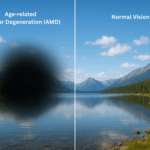Choosing the right laser eye surgery can feel overwhelming, especially with options like SMILE pro, TransPRK, and FemtoLASIK. Each procedure is designed to correct vision and reduce or eliminate the need for glasses and contacts, but the best choice depends on your eye condition, lifestyle, and vision goals. Here’s a breakdown of each option to help you decide.
What is SMILE pro?
SMILE pro (Small Incision Lenticule Extraction) is a minimally invasive procedure that corrects myopia and astigmatism. Unlike LASIK, it doesn’t involve creating a corneal flap. Instead, a small incision is made in the cornea to remove a lenticule, reshaping the cornea and improving vision.
- Best for: Individuals with myopia and mild astigmatism seeking a minimally invasive procedure with fast recovery.
- Benefits: Quick recovery, less dry eye risk, no flap-related complications.
- Considerations: Limited to certain prescriptions (myopia and mild astigmatism).
What is TransPRK?
TransPRK (Transepithelial Photorefractive Keratectomy) is a surface-based laser surgery that does not require an incision or flap. Instead the laser simply ablates (surgically removes) the outermost layer of cells on the surface of the eye to reach the cornea. This makes it an excellent choice for individuals with thin corneas or those who aren’t eligible for FemtoLASIK or SMILE pro. TransPRK offers more versatility by treating a wider range of refractive errors, including myopia, hyperopia, and astigmatism. However, it comes with a longer recovery time and more post-surgery discomfort, as the outer layer of the cornea takes time to regenerate.
- Best for: Patients with thin corneas, irregular corneas, or those wanting to avoid any cuts or flaps.
- Benefits: No flap creation, suitable for thin corneas, less invasive.
- Considerations: Longer recovery time and more discomfort during healing.
What is FemtoLASIK?
FemtoLASIK is a popular procedure where a femtosecond laser creates a corneal flap. After the flap is lifted, an excimer laser reshapes the cornea to correct the vision. The flap is then repositioned, and recovery begins.
- Best for: Those seeking fast recovery, minimal discomfort, and who have suitable corneal thickness for flap creation.
- Benefits: Quick visual recovery, minimal post-op discomfort.
- Considerations: Slight risk of flap-related complications, such as displacement.
Which One Is Best for You?
The best choice between SMILE pro, TransPRK, and FemtoLASIK depends on several factors, including your eye health, lifestyle, and personal preferences.
- SMILE pro is ideal for those with myopia and mild astigmatism who want a minimally invasive option with a fast recovery.
- TransPRK is better suited for individuals with thin or irregular corneas or those who prefer a surface-based procedure without incisions or flaps.
- FemtoLASIK offers the quickest recovery and is a great option for those with appropriate corneal thickness and who want minimal post-surgery discomfort.
Conclusion
Ultimately, the decision between SMILE pro, TransPRK, and FemtoLASIK depends on your unique eye conditions and vision goals. Consulting with an experienced ophthalmologist will provide personalized guidance on which procedure is the best fit for you.






